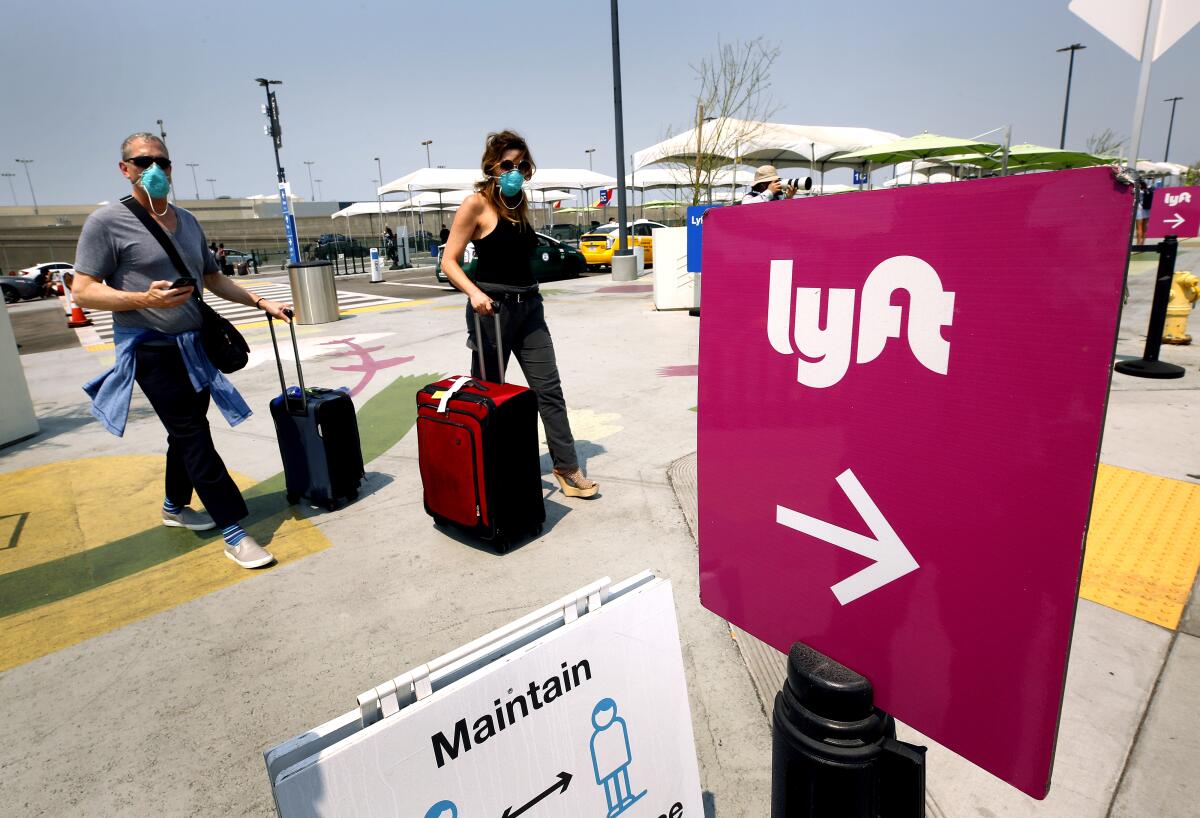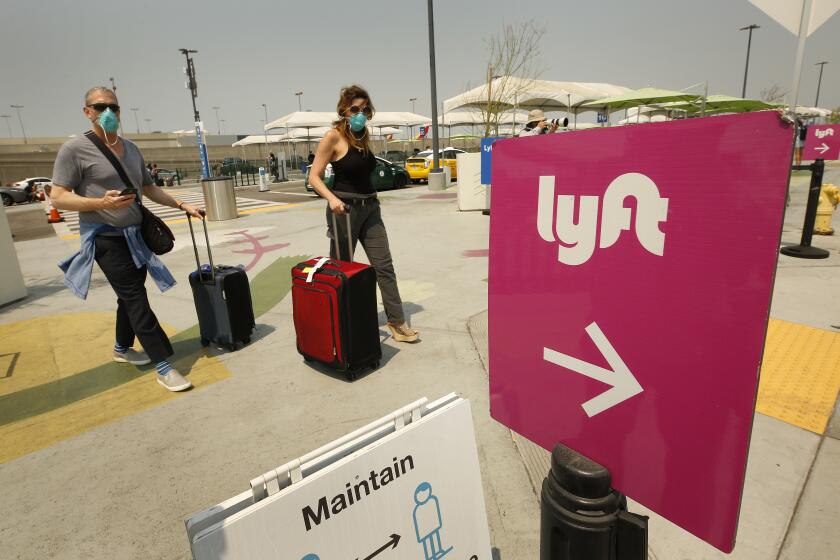Newsom breaks from fellow Democrats and aligns with the enemy on Lyft-backed Prop. 30

SACRAMENTO — This is very rare: a California governor on the opposite side of his state party on a major public policy issue.
Not just taking sides against the Democratic Party, but also opposing his core political base: environmentalists and much of organized labor, including firefighters.
Conversely, Gov. Gavin Newsom is aligned with the enemy — the California Republican Party — plus the state Chamber of Commerce and the California Taxpayers Assn.
And on this issue, Proposition 30 on the November ballot, bravo for the governor.
Most of his traditional allies in the California Democratic establishment are living up to the national reputation they long ago earned as knee-jerk, tax-and-spend, out-of-control liberals.
There’s one major exception: the powerful California Teachers Assn., which is partnered with Newsom in opposing the ballot initiative. The CTA believes the measure would ultimately harm guaranteed funding for K-12 schools and community colleges.
“It was written deliberately to get around California’s school funding law,” says Becky Zolgman, a CTA executive director.
As I’ve previously written, Proposition 30 would embroider California’s reputation as a far-left state drawn to tax hikes rather than setting spending priorities.
But the measure could pass because it raises taxes on only the very rich — again. This time, it would be to help fight climate change and douse wildfires. And who’s against that?
“A Trojan horse,” Newsom calls it. “A terrible, terrible initiative.”
Proposition 30 would raise California’s state income tax rate to a ludicrous 15.05% by adding an additional 1.75% to the current-record 13.3%. That’s by far the highest rate in the nation. Hawaii is No. 2 at 11% and neighboring Oregon’s is 9.9%. But Oregon doesn’t have a state sales tax. We also rank No. 1 in sales taxes.
Two red state competitors, Texas and Florida, impose no income tax at all. Neither do five other states, including Nevada next door. The highest rates elsewhere tend to be in the mid-single digits.
So, a 15.05% income tax rate — on top of California’s other high taxes — would not be a good marketing tool when trying to recruit investors into California.
The tax hike proposed in Proposition 30 would be imposed on personal incomes exceeding $2 million a year, raising up to $5 billion annually, according to the Legislative Analyst’s Office.
But the 15.05% rate would be levied only on annual incomes exceeding $2 million — just 0.2% of tax filers.
It would raise $3.5 billion to $5 billion annually, according to the Legislative Analyst’s Office. Of that, 80% would be spent to help California motorists convert to electric vehicles by providing rebates for purchases and installing charging stations. At least half would go to low-income households.
The remaining 20% would be aimed at preventing and fighting wildfires.
Ride-hailing Lyft is the big bankroller of Proposition 30, investing about $35 million in the measure so far.
The state has ordered all ride-hailing companies to convert to zero-emission vehicles by 2030. Proposition 30 would make it much easier financially for drivers to purchase electric vehicles and keep them charged. Lyft and its rivals need lots of drivers to make their business models work.
In a TV ad opposing Proposition 30, Newsom calls it “a special interest carve-out — a cynical scheme devised by a single corporation to funnel state income tax revenue to their company.”
Actually, the money would go to state agencies to parcel out. But Lyft would benefit because the tax money would help supply it with drivers.
“He doesn’t want a tax increase when he’s running for president,” says Democratic consultant Steve Maviglio, a strategist for the Proposition 30 campaign.
Is he running? He’s certainly getting a lot of national media speculation about it. And that’s his immediate goal — to get his name out there and be “mentioned.”
In recently running ads attacking two conservative Republican governors, Ron DeSantis of Florida and Greg Abbott of Texas, Newsom is moving into position to run for president if the job opens up in 2024 or 2028, I figure. He’s trying to stoke interest among the Democratic progressive base, while denying publicly that he dreams of sitting in the Oval Office.
I think he’d be better off — and win a lot more Democratic friends — if he spent time in neighboring Nevada campaigning for Sen. Catherine Cortez Masto, who’s in a tight race with Republican challenger Adam Laxalt. That contest could decide who controls the U.S. Senate.
But back to Proposition 30.
California Democratic Party Chairman Rusty Hicks said in an email that the party backs the measure because “fighting for clean air and public health are core values” and “the fight against climate change is absolutely worthy of a dedicated funding stream to make the investments needed to save the planet.”
Newsom counters that the state has committed $10 billion over five years for electric vehicles and charging stations, part of a $54-billion package to fight climate change.
But Proposition 30 supporters point out that this funding isn’t guaranteed. It could be whacked by legislative budget cutters in a recession.
“The Legislature is not capable of making the massive commitment that is required to fight climate change,” says Maviglio, a former legislative staffer. “Their politicians view everything in a two-year lens. That’s all the state budget allows.”
Perhaps, but there’s also the evil of ballot box budgeting. That’s when a special interest, such as Lyft, bypasses elected officials and tries to achieve budgeting favors through the electorate. But we elect a governor and Legislature to make those decisions. It’s how the Founders designed the system.
A recent poll by the Public Policy Institute of California showed 55% of likely voters support the measure, with 40% opposed. But Proposition 30 had lost significant support since the last PPIC survey.
Hopefully that trend continues.
More to Read
Sign up for Essential California
The most important California stories and recommendations in your inbox every morning.
You may occasionally receive promotional content from the Los Angeles Times.












